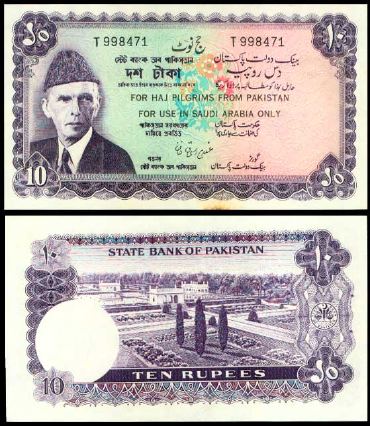Did you know that from the 1950 through the mid 1990s the State Bank of Pakistan would publish special Hajj Notes in Rupees for Pakistani Hajis?
The paper makes some interesting reading for history buffs as well as for collectors of banknotes.
The article was written by P.J. Symes, an Australia based author who has written on paper currency from different parts of the world, including on the Paksitan Haj Notes. Some excerpts (reading the full article is highly recommended for enthusiasts):
From the time that Pakistan gained its independence in 1947… any Pakistani notes exported from Pakistan could be freely converted into foreign exchange. This free conversion was possible due to the Pakistani government promising to convert Pakistani rupees into pounds sterling on presentation of their notes for payment.
The free convertibility of the Pakistani rupee created opportunities for rupees to be smuggled out of Pakistan and later presented by foreign banks to the Pakistani authorities for payment in pounds sterling. These opportunities were exploited by gold smugglers. In India and Pakistan, gold has long been a medium of trade and a sign of wealth. However, it was illegal in both countries to import or export gold. This consequently encouraged criminals and adventurers in Pakistan to take Pakistani rupees to the Gulf states, purchase gold, and smuggle the precious metal back into Pakistan. Whilst many smugglers were caught, many succeeded. The Pakistani rupees that had been used to purchase gold in the Gulf states were returned through the international banking system and presented to the Pakistani authorities for payment in sterling. Pakistan thus found itself sponsoring the illegal importation of gold through the expenditure of its foreign reserves.
In September 1949 the pound sterling was devalued, but Pakistan chose not to devalue its currency in line with the British standard. Aware that smuggling might increase, because of speculators taking advantage of the devaluation of the pound sterling, complete restrictions were placed on the export and import of Pakistani currency. The only exception to these restrictions was for currency taken to Saudi Arabia by Haj pilgrims. Pakistani pilgrims were permitted to take Pakistani currency, up to certain limits, to Saudi Arabia where it was exchanged for Saudi riyals and later returned to the Pakistani authorities by the Saudi Arabian banks. However, in the year following the pound’s devaluation, it was noticed that far more currency than could possibly have been taken by the pilgrims was repatriated from Saudi Arabia – even assuming each pilgrim took the maximum permissible amount. It was apparent that the restrictions put in place by the Pakistani government were being circumvented by smugglers taking Pakistani rupees to the Gulf states and having them returned via the legitimate channel of the Saudi Arabian banks.
Realizing that they had to provide a solution to the problem of smuggling, as well as providing simple exchange facilities for Haj pilgrims, the government decided to issue special notes for the express use of the pilgrims. Although other means of exchange were considered, such as traveller’s cheques and bank drafts, the high level of illiteracy amongst the pilgrims and the additional costs that would be incurred through the need to purchase the items, swayed the government from these methods of exchange.
The ordinance amending the State Bank Order to allow the issue of special notes, or ‘Haj notes’ as they became known, was made in May 1950. The first Haj note issued by the government was a 100-rupee note. The Haj note was prepared with the same design as the existing 100-rupee note, but the colour was changed from green to red and an over-print was applied to the front of the note, indicating the specific use of the notes. The overprint read (in English): ‘For Pilgrims From Pakistan For Use In Saudi Arabia and Iraq.’ The Haj notes were not legal tender in Pakistan, but they could be used in Saudi Arabia to purchase Saudi riyals and be remitted to Pakistan via the usual channel of the Saudi Arabian banks.
The introduction of the 100-rupee Haj note was an outstanding success for the government. In 1949, the year before the introduction of the Haj note, Pakistani notes to the value of Rs. 28,045,308 were repatriated from Saudi Arabia. In 1950, following the introduction of the Haj notes, only Rs. 11,186,100 were repatriated. This indicated a great saving for the government and the notes also proved popular with the pilgrims… While Mecca is the destination for all Muslim pilgrims, there are a number of sites in Iraq that are considered holy by Shia’ah Muslims. Therefore, it has been the practice of Shia’ah Muslims to visit Iraq as part of their pilgrimage. Although the precise details of remitting Pakistani rupees from Iraq is unknown, it can be speculated that Pakistani rupees once enjoyed the same status in Iraq as they did in Saudi Arabia; as the first 100-rupee Haj note had indicated that their use was valid in ‘Saudi Arabia and Iraq’. It appears that by the time the 10-rupee note was introduced, the Government of Pakistan (or the State Bank of Pakistan) had decided to exclude Iraq as a destination to receive and remit Haj notes; as the new overprint indicates the notes were ‘for use in Saudi Arabia only’. Due to the limited number of surviving examples of this note, speculation can only be made as to whether later production runs of the 100-rupee notes always included the overprint that referred to Iraq, or whether it was replaced with an overprint similar to that which appeared on the 10-rupee notes.
Haj notes continued to be issued throughout the 1950s, with the number issued each year being subject to great fluctuations, due to the number of pilgrims undertaking the Haj in any given year. In fact the government sometimes limited the number of pilgrims who could undertake the pilgrimage, in order to control the drain on foreign exchange. In 1958 the number of pilgrims from Pakistan was 17,000 and cost Pakistan US$6 million in foreign exchange. In 1959 the government announced that a limit of 9,200 pilgrims would be allowed to undertake the Haj, saving the country an estimated US$3 million.
In the early 1950s, pilgrims travelling to Saudi Arabia on their Haj invariably did so by ship. In order to provide Haj notes to the pilgrims prior to their departure, the State Bank of Pakistan established booths at the ports of Karachi (West Pakistan) and Chittagong (East Pakistan). As times changed, air travel became an option for increasing numbers of pilgrims. The change in travel, and the need to keep track of the number of pilgrims and their expenditure, led to tighter controls on the costs incurred by pilgrims on their Haj. For many years it has been the custom for pilgrims to deposit all disbursements for their Haj with one of the commercial banks. The disbursements included the air-fare, the Haj fee charged by the Saudi Arabian government, and the pilgrim’s expenses in Saudi Arabia. The bank then supplied the pilgrims with their air tickets and their Haj notes to be used for daily expenses.
During the period leading to these changes, and as international currency exchange throughout the world became more competitive, various options for Haj pilgrims were introduced, such as Saudi Arabian pilgrim receipts and travellers cheques… While the use of Saudi Arabian pilgrim receipts was short-lived for Pakistani pilgrims, within a few years the use of traveller’s cheques began to increase as their use became more common and their acceptance in Saudi Arabia grew.
The article goes son to detail the design features of the various Hajj Notes issues by Pakistan over the years. However, I found this account fascinating as a piece of the largely forgotten economic history of Pakistan, and also of a rather interesting financial innovation from Pakistan.
src=’pakistaniat.com’










